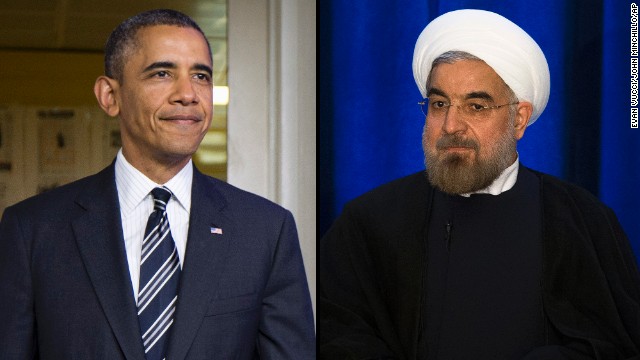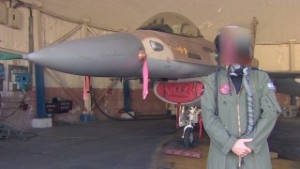Iran nuclear talks: Why there's room to strike a deal
October 15, 2013

Iranian insider on talks with the West
STORY HIGHLIGHTS
- Despite areas of mutual interest, securing trust between Iran and U.S. won't be easy
- Iran must be transparent over nuclear program; U.S. must allow Iran access to SWIFT
- Ghadar: A partial deal out of talks could bring Iran back into global fold
Editor's note: Fariborz
Ghadar, a distinguished senior scholar and senior adviser at the Center
for Strategic and International Affairs, is a professor and founding
director of the Center for Global Business Studies at Penn State
University.
(CNN) -- This week Iran and world powers finally
commence long-delayed nuclear negotiations in Geneva. Was it a
coincidence that just a few days ago, Barack Obama and Iranian President
Hassan Rouhani engaged in a monumental 15-minute phone call and
reopened a line of communication that has been closed for more than
thirty years?
It's clear that Iran's
new president hopes to establish trust between the West and Iran so that
sanctions on Iran's economy are removed. In return Rouhani, who says
Iran has no intention of developing nuclear weapons, promises to offer
complete transparency into the country's uranium enrichment program.

Fariborz Ghadar
Securing this trust
between both Iran and the United States, however, will be no easy feat.
Decades of political antagonism -- along with Iran's Revolutionary Guard
and the U.S. Congress -- stand in the way of a successfully negotiated
outcome.
Iran and the U.S. have a
number of areas of mutual interest: stability in Iraq, peace and
security in Afghanistan, and the resolution of the conflict in Syria.
Iran has control and influence over the region via its affairs with and
support of Hezbollah in Lebanon and Syria.
All of these difficulties
are compounded by the nuclear issue. But the resolution of the crisis
through a grand bargain would in fact benefit not only the U.S., but
also its allies in the region. And although the thought of a compromise
with Iran concerns Israel, Saudi Arabia, and the emiratis of the region,
that doesn't mean all is lost.
 Israeli Air Force pilots warn Iran
Israeli Air Force pilots warn Iran
The stringent sanctions
on trade with the U.S. and Europe have seen Iran gradually shift its oil
and gas trade toward Asia -- namely China and India. But Iran's
exclusion from the SWIFT currency clearing system has forced Tehran to
deal in local currencies. When Iran trades with India it receives rupees
in exchange for its oil. Iran then uses the rupees to buy Indian
products, but it has ended up selling more oil than it has made in
imports, creating a trade imbalance.
Relaxation on sanctions
on these trading partners will be easier to implement. While sanctions
related to medical necessities have already been relaxed, and
discussions about freer trade in petrochemicals and the loosening of
trade controls on gold have been mentioned, Iran will hardly perceive
these steps as sufficient.
In reality, in the short
term, Iran needs to be granted access to fund transfers via SWIFT. In
the longer term, the U.S. will be asked to ensure Iran has access to the
proper technology required for efficient oil and gas production.
Projects — such as the pipeline that supplies Iranian oil to Pakistan
and India, and thus benefits not only Iran but also Pakistan and India —
will need to be allowed to be implemented.
In exchange for U.S.
help in removing some of the sanctions and in the opening up of
exportation channels, Iran would need to agree to complete transparency
and to the closure of some of its nuclear facilities. But the hurdles
are many, and the most complicated and involved ones are with the U.S.
Congress. The Obama administration has limited control over the actions
of the legislative branch, and voting against Iran may be more
politically expedient for lawmakers on Capitol Hill. This is one of the
reasons why Ayatollah Khamenei, Iran's Supreme Leader, has said he
believes America is not reliable and cannot be trusted.
Despite these
difficulties, I believe there remains room to strike a deal. Iran may be
willing to provide significant transparency, including extensive and
thorough inspections of all nuclear operations, a reduction in the
amount of nuclear material produced and stored in Iran, and even the
dismantling of a few thousand centrifuges.
But Iran will be
reluctant to relinquish its 20%-enriched uranium, which experts believe
can easily be weaponized, unless the West is willing to provide similar
material for use in Iranian research facilities.
For its part the P5+1 --
the United States, Russia, China, France, Britain and Germany -- would
need to make trade with Iran less burdensome by allowing a specified set
of Iranian banks access to currency clearing via SWIFT. The U.S. and
its partners would also need to remove a number of sanctions to allow
Iran to more freely trade its oil with its partners to the East and be
paid for it in tradable currencies.
If trust can be
established and a bargain can be struck, the sheer size of Iran's
population of 75 million could make it the largest economy to rejoin the
global system since the collapse of the Eastern bloc economies. Many
Iranians are well-educated and eager to participate in the global
market, providing an ideal situation from which many future businesses
could emerge.
If it is perceived by
the Western world that Iranian discussions with the U.S. seem to be
going well, the Americans will likely see enormous business pressure
from others, including our European friends, to accelerate the process
of reducing sanctions.
Despite the complex and
often-conflicting interests of the negotiating parties, I believe at
least a partial deal will be struck between Iran and the West -- an
agreement that begins to bring Iran back into the international fold and
provides steps to end 34 years of what has been a lose-lose situation
for everyone involved.
--------------------------------------------------------------------

ไม่มีความคิดเห็น:
แสดงความคิดเห็น